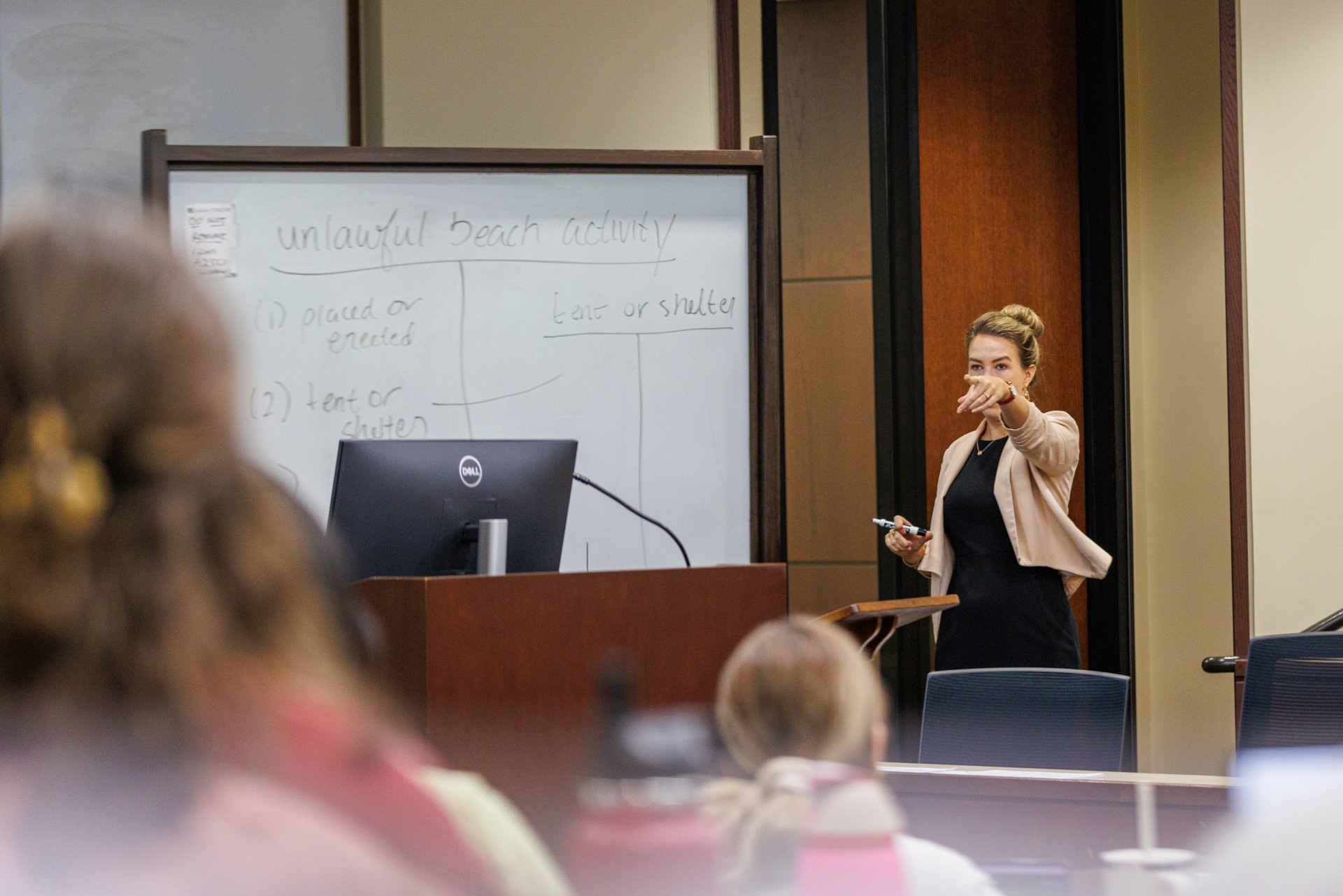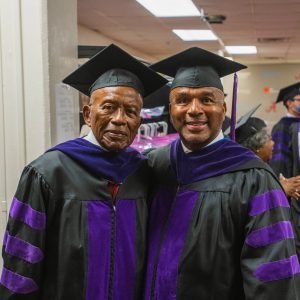The University of Alabama School of Law’s faculty research spans diverse fields such as constitutional law, environmental policy, and international relations, addressing critical issues like climate change, workplace discrimination, and nuclear control. By merging theoretical insights with practical applications, their work influences policy and practice, providing tangible benefits locally and globally. The interdisciplinary nature of their studies—covering topics like AI in judicial processes and privacy in the digital age—creates a dynamic academic environment that fosters critical thinking. This prepares students to become thoughtful, impactful legal professionals equipped to navigate and shape the future legal landscape.
Alabama Law's pioneering faculty research inspires critical thinking
and prepares students to tackle global challenges and shape the future of law.
Faculty News
Recent Research
Look What You Made Me Do
Russell M. Gold: Who’s to blame for crime? Individuals who commit crime or a society that has failed to keep those individuals safe and let them suffer severe economic deprivation? Both. But American criminal legal processes stifle that complex answer. Instead they coerce defendants into expressing a profoundly simple narrative: crime is solely individual choice to do wrong. This…
Individualized Guidance in the Federal Bureaucracy
Shalini Bhargava Ray: This report was prepared for the consideration of the Administrative Conference of the United States. The opinions, views, and recommendations are those of the author and do not necessarily reflect the views of the Conference (including its Council, committees, or members), except where recommendations of the Conference are cited.
Mitigating Abusive Tax Shelters: A Historical Approach
Harrison Carter: For the last fifty years, the United States has battled abusive tax shelters, unintended (and often fraudulent) benefits claimed by sophisticated taxpayers, which arise from a tax code that constantly grows in its complexity. The Internal Revenue Service (IRS) is constantly at odds with taxpayers seeking aggressive tax savings. The IRS is tasked with maximizing revenue, and the taxpayer seeks the…
Economic Nationalism as the Fourth Era of International Trade Law
Daniel Joyner: This article contextualizes and explains, from both theoretical and practical perspectives, some of the most recent and impactful changes to international trade law development in critical and emerging technology areas. It begins by describing developments in international trade law in the 20 th and 21 st centuries through the identification of four eras of that development: 1) prewar…
Three Interventions to Address the Other Pandemic-Firearm Injury and Death
Frederick P. Rivara, Fredrick E. Vars, Ali Rowhani-Rahbar: While infections, hospitalizations, and deaths from the severe acute respiratory syndrome coronavirus 2 (SARS-CoV-2) pandemic overshadowed nearly all other health issues in the US in 2020, the problem of firearm injuries and deaths has continued unabated. Indeed, firearm sales increased during the pandemic, driven in part by a perceived need for self-protection amid concerns of breakdown in law…
From Hospitals To Prisons: A New Explanation
Fredrick E. Vars: Deinstitutionalization from state mental hospitals was largely over by 1980, but the percentage of prisoners with mental illness did not begin to skyrocket until 1990. The leading theories for the criminalization of mental illness cannot fully explain this gap. This Essay offers a new theory: the Supreme Court in 1990 reduced the costs of incarcerating the severely mentally ill by approving the…
When God Spikes Your Drink: Guilty Without Mens Rea
Fredrick E. Vars: Two men walk into a bar. An hour later, one man shoots dead the other. The charge is first-degree murder, which requires a specific intent to kill. The shooter was unable to form that intent. In many states, if the source of incapacity was intoxication, then he will be acquitted. But if the two men were drinking water, the shooter had schizophrenia, and the source of incapacity was a paranoid…
The Ultimate Gift Horse: Modernizing the UPC on Advancements to Avoid Unintended Redistributions
Jackie Elder, Fredrick E. Vars: A common tax avoidance strategy is to make annual lifetime gifts in the maximum amount exempt from the gift tax in order to reduce or avoid the estate tax. These gifts are likely intended as an intergenerational transfer of wealth, only differing from passing through the estate in timing. The donors probably don't intend for their tax avoidance strategy to affect…
Attitudes Toward Affirmative Action: Paradox or Paradigm?
Fredrick E. Vars: Race versus Class traces the evolution of affirmative action policies and explores the issues surrounding the current debate. In addition to providing fundamental facts, the book presents original insights and recommendations for salvaging the policy. Included among the essays are case studies of race-exclusive scholarships, housing policies, and the Head Start program. The book also includes a…
Giving the Invisible Hand a Relatively Free Hand
Ronald J. Krotoszynski Jr.: Arriving at a truly global consensus on how best to protect personal data will constitute an exceedingly difficult undertaking if the United States is to play a meaningful part in this project to advance global digitality. As this chapter will explain, the reasons for this are both legal and cultural. US law, at the federal level, does not feature strong statutory protection for informational…
Free Speech as Civic Structure
Ronald J. Krotoszynski Jr.: It is entirely natural to think that codifying a human right will have a meaningful impact on both the right's scope of application and the willingness of judges to safe guard it. This might well hold true in general, but, as this book will show, it does not appear to hold true for the protection of expressive freedom (meaning the freedom of speech, press, assembly, association, and…
The Future of Frozen Embryos
Clare Ryan, Benjamin J. McMichael: The 2024 Alabama Supreme Court decision in LePage v. Center for Reproductive Medicine, which declared frozen embryos to be “children,” represents a significant shift in the legal treatment of in vitro fertilization (IVF) in the United States. This Article examines the context, implications, and potential consequences of LePage for family law, tort law, and access to reproductive technologies. The…
Sharing is Caring: Does Organ Allocation Policy Work?
Benjamin J. McMichael: I examine changes in organ allocation policies. I find these policies increase national organ sharing and improve some transplant-specific outcomes. I introduce the novel concept of "transplant amenable deaths" to measure policy impacts beyond the transplant system, addressing an important gap in the literature. These deaths, representing potential lives saved by transplants, increase…
Inequitable Organ Allocation
Benjamin J. McMichael: Seventeen people die every day in the United States waiting for an organ transplant, and over 100,000 people are currently on waitlists to receive a donated organ. Given these stark numbers, the allocation policies governing who receives donated organs are both critically important and hotly debated. Congress passed the National Organ Transplant Act in 1984 with the goal of eliminating markets for…
Cutthroat Business
Luke Herrine: The production of meat is almost entirely controlled by a small group of multinational agribusinesses. These corporations own everything from animal genetics to feed to wholesaling to slaughtering to butchering-leaving only the raising of the animals to nominally independent farmers, who are, in turn, controlled through one-sided contracts. Packing companies use this power not just to push down…








